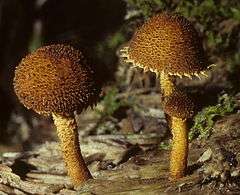Flammulaster erinaceellus
| Flammulaster erinaceellus | |
|---|---|
 | |
| Scientific classification | |
| Kingdom: | Fungi |
| Division: | Basidiomycota |
| Class: | Agaricomycetes |
| Order: | Agaricales |
| Family: | Tubariaceae |
| Genus: | Flammulaster |
| Species: | F. erinaceellus |
| Binomial name | |
| Flammulaster erinaceellus (Peck) Watling (1967) | |
| Synonyms[1] | |
Flammulaster erinaceellus is a species of fungus in the agaric family Tubariaceae. It was first described in 1876 as Agaricus detersibilis by Charles Horton Peck.[5] Roy Watling transferred it to Flammulaster in 1967.[6] The fruit body has a hemispherical to convex cap 1–2.5 cm (0.4–1.0 in) in diameter that is covered with small, erect, brownish scales that can be readily rubbed off. The gills have an adnexed attachment to the stipe. The stipe is up to 2.5 cm (1.0 in) long and 2 mm thick. It is either hollow, or stuffed with a pith-like mycelium. The spores measure 7.5–9 by 4–5 µm. Fruiting occurs on logs in the woods.[7]
References
- ↑ "Flammulaster Earle 1909". MycoBank. International Mycological Association. Retrieved 2013-11-01.
- ↑ Peck CH. (1878). "Report of the Botanist (1876)". Annual Report on the New York State Museum of Natural History. 30: 23–78 (see p. 70).
- ↑ Singer R. (1951) [1949]. The Agaricales in Modern Taxonomy. Lilloa. 22. Weinheim: Cramer. p. 577.
- ↑ Orton PD. (1960). "New check list of British Agarics and Boleti, part III (keys to Crepidotus, Deconica, Flocculina, Hygrophorus, Naucoria, Pluteus and Volvaria)". Transactions of the British Mycological Society. 43 (2): 159–439 (see p. 175). doi:10.1016/s0007-1536(60)80065-4.
- ↑ Peck CH. (1876). "Report of the Botanist (1874)". Annual Report on the New York State Museum of Natural History. 28: 31–88.
- ↑ Watling R. (1967). "The genus Flammulaster". Notes from the Royal Botanical Garden Edinburgh. 28: 65–72.
- ↑ Kauffman CH. "The Agariciceae of Michigan". 1. Lansing: Wynkoop Hallenbeck Crawford Co., State Printer: 303.
External links
This article is issued from Wikipedia - version of the 11/18/2016. The text is available under the Creative Commons Attribution/Share Alike but additional terms may apply for the media files.